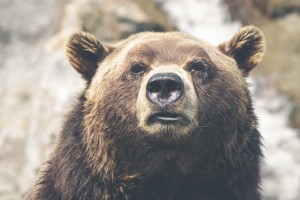
Here’s an interesting op-ed from the Billings Gazette centering around the weird, wonderful process of grizzly bear hibernation.
For more information on bear hibernation, see these posts: Bear hibernation linked to changes in gut microbes and Grizzly studies may provide help for human obesity.) . . .
By now most of Yellowstone’s grizzly bears are snug hibernating in winter dens, safe at last from human dangers.
But in the darkness below the snow, mysteries and miracles unfold, apropos of our Christmas season. Researchers have long known the basics of bear hibernation. These bruins don’t eat or drink or excrete waste for between 150 and 180 days. But when grizzly bears crawl out of their dens in spring, they are specimens of health. They lose very little bone strength or lean muscle mass, though they may lose as much as 30 percent of their fall weight.
Unlike deep hibernators like ground squirrels, bears are not unconscious during their winter slumber, which allows mother grizzlies to give birth in the dead of winter to a cub or two, each the size of a teacup, which she groggily nurses in her den until sometime during April or even May.
How does a mother bear pull off this feat? Part of her secret involves obesity. Gorging on foods ranging from bison to ants, she packs on several pounds a day during her late summer and fall feeding frenzy.